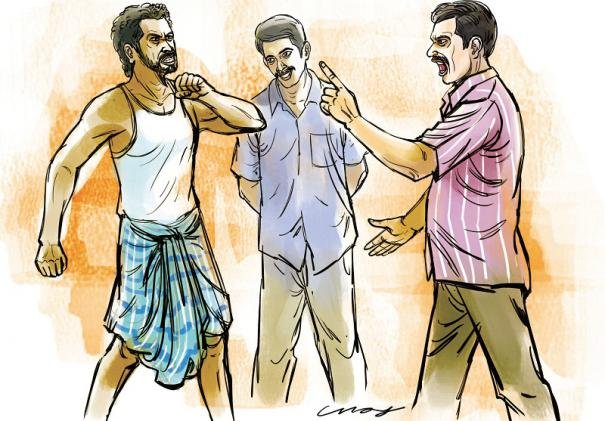Reject The Twin Devils – Build An Alternative Beyond The Election
Vote for me, the “known devil”, exhorts the incumbent Mahinda. Meanwhile the essence of the main opposition campaign is an appeal to vote for the lesser evil, or the ‘unknown devil’ Maithri. In fact in terms of what’s on offer for the working and oppressed masses of Sri Lanka they are ‘twin devils’.
The opposition wants this election to be a two-horse race and claims that any other candidature will merely divide the vote and will be a waste. With this argument, Maithri’s supporters aim to crush those who want to stand on principle and provide a long-term strategy for ending repression and decisively changing the conditions of those who suffer under the Rajapaksa rule. The anti-Mahinda vote, congealed solely in the person of Maithri, is the only way to end the Rajapaksa’s family grip – or so we have been told. But it is worth remembering that devils don’t come readymade – they are formed over time. Mahinda looked more ‘progressive’ than Chandrika and Maithri in 2005.
What makes one candidate more evil, or lesser evil, or not evil, is facts – what they stand for, what they do, and what social forces they seek to base themselves on. So let us examine Maithri’s application to be considered as a lesser evil. Maithri is a ‘known’ close companion of the JHU and is ‘known’ to follow the same approach that MR takes on most issues. His promises of minor changes in the way he would govern do not amount to a hill of beans. There will not be a new constitution or even attempts to reverse all the damage done by the ‘royal family’. In other words we could hardly differentiate between these twin devils.
Is a lesser evil argument going to decisively convince voters? It is a world phenomenon that significant numbers of people abstain from the election process, feeling anger at a ‘choice’ of parties that all want to attack their living standards and make them pay for the economic crisis caused by the super-rich. In the UK, for example, more people voted in the X-factor TV talent programme than in the last general election. However, as we saw in the independence referendum in Scotland and in the Northern provincial election in Sri Lanka, people are enthusiastic to exercise their voting rights once they feel it will make a difference. But when you present candidates like these twin Ms, people eschewing the voting booth can become the dominant trend. It is no surprise this feeling is dominant among Tamils who are promised no relief from the repression they face in Maithri’s stand.
There are some, of course, will not be able to bring themselves to vote for JR Jayewardene’s heirs in the capitalist UNP alliance no matter what. Siritunga standing in this election is an incentive to this layer to turn up to vote and not be silenced by the so-called ‘mainstream’.
But providing such an opportunity in the election is not the sole aim of Siritunga’s campaign. If a real change is to be achieved, the silent minority of all progressive sections in the country need to be mobilised. The people’s voice is weak. Unless the oppressed masses have a strong organisational expression for their rightful demands, our rights will continue to be suppressed. The need for an organisation or a mass party that can articulate our rights and that will not gamble or compromise us is felt throughout the country. The thirst for such an organisation is registered by the hundreds of thousands who turn up to meetings in opposition to both Ms. Siri’s platform aims to provide energy and hope that such an alternative can be built.
Regardless of who will win the election, the campaign to fight for our rights must continue. If this is to be strengthened, alternative mass forces need to be built. Many activists sincerely hope that the election time could be used to achieve that aim. Siritunga’s campaign only adds to this aim.
It is widely known that Siri stands for the right to self-determination of the Tamil-speaking people among many other demands that are relevant. His platform is much more progressive than any other candidate. But, apart from Sivajilingam and a few other noted exceptions, the TNA leadership ignored this, hence losing support among Tamils, particularly among youth.
Tamil Solidarity, based mainly among diaspora youth, has worked with Siritunga in the past in the anti-war campaign. Tamil Solidarity is the only campaign to come forward to openly support Siri. This decision has further improved the influence of this campaign among Tamils – youth in particular. Imagine the reputation the TNA could have maintained if they managed to show a fighting face for a candidacy that stands full-square for the right to self-determination. And what a warning this would be to the next chauvinist, capitalist government whatever face it wears – your greatest foes are capable of uniting in struggle and of learning the lessons of history.
It is good to see that a section of TNA leaders and TNA youth have come forward in opposition to the current leadership. But they seem to be still unable to take the extra step of supporting those who stand on principle. This has led to claims that Tamils don’t have a ‘tradition of supporting the left’. This is wrong. But there has been a long and sorry history of the so-called Tamil leadership (such the TNA now) having a conscious anti-left attitude. It must also be said, if we are to correctly learn from history, that the list of betrayals by some left leaders is a factor.
Now, for the first time in history, we are beginning to see a change in this. The uncompromising position of Siri can assist in the rebuilding of trust in left forces as a reliable force for Tamil workers and young people in their fight for their rights. Other diaspora organisations, while recognising the lack of choice, allowed themselves to be silenced (apart from the right-wing GTF which doesn’t have much support among Tamils – youth in particular). This silence will go down in history as another failure in the long list of mistakes by Tamil leaders. They must explain publicly what stops them supporting a candidate who stands for, and provides a programme to fight for, all what they want and more. Will they?
Without doubt all protests against the regime and its allies should come forward. But what is needed to harness the determination to struggle of the masses is organisation, a programme that can unite and ideas that can inspire. Not a loose electoral coalition with those who will not make any changes – but building a force that is prepared to take the fight on beyond election. We should start the discussion to build such an alternative.



















